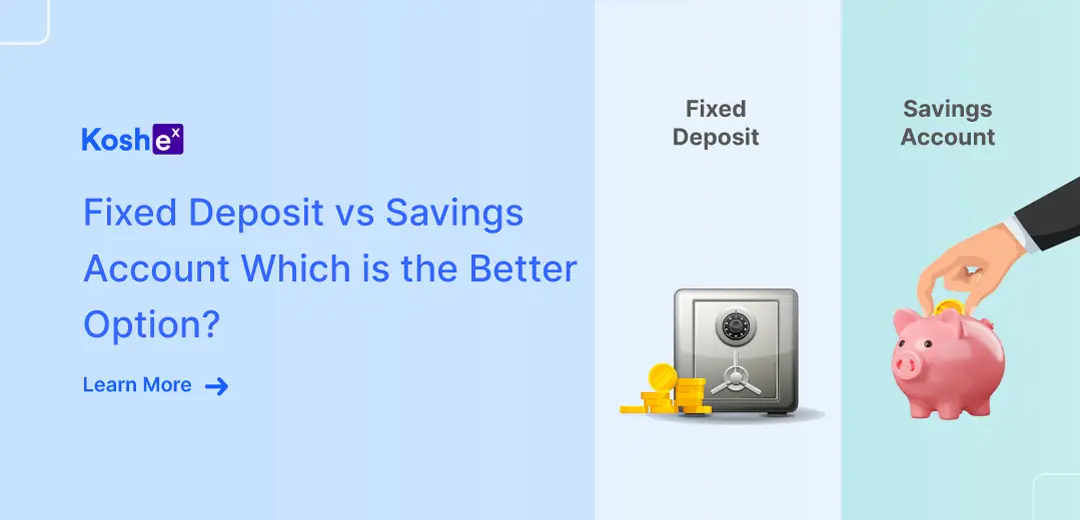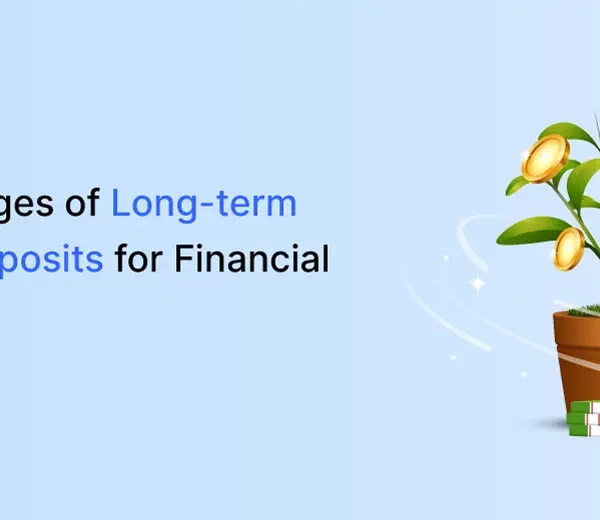In India, both Fixed Deposit and Savings Accounts are popular investment options. The choice of where to invest your money or whether a fixed deposit is better than a savings account can significantly impact your financial journey. Both of these financial instruments offer distinct advantages and cater to different financial goals. However, the question remains: Which is the superior option?
We unscramble the intricacies of each option, exploring their merits, drawbacks, and suitability for varying financial circumstances. Whether you are aiming for wealth accumulation, financial security, or a balance between the two, understanding the nuances of fixed deposits and savings accounts is essential.
Through a careful analysis of their features, risks, returns, and suitability, we aim to equip you with the knowledge needed to make an informed choice that aligns with your aspirations and goals.
Our tailored solutions at Koshex will help you navigate the complexities of personal finance, ensuring you make the right choice for your unique financial goals.
Brief Explanation of Fixed Deposits and Savings Accounts
Fixed Deposits
Fixed deposits, also known as time deposits, are a tried-and-true investment option offered by financial institutions. When you invest in a fixed deposit, you commit a specific sum of money for a predetermined period, during which the funds remain locked. In return, the bank provides you with a fixed interest rate that accumulates over the tenure of the deposit.
Fixed deposits offer stability, security, and a predictable return on your investment, making them an appealing choice for risk-averse individuals seeking assured growth.
Savings Accounts
Savings accounts, on the other hand, are transactional accounts offered by banks that facilitate day-to-day financial activities. Unlike fixed deposits, savings accounts prioritize liquidity and easy access to funds. They often offer lower interest rates compared to fixed deposits but provide the convenience of unlimited withdrawals and deposits. Savings accounts are commonly used for storing emergency funds, facilitating regular transactions, and maintaining a financial safety net.
Importance of Comparing Fixed Deposits and Savings Accounts
When it comes to choosing between fixed deposits and savings accounts, the significance of a well-informed decision cannot be overstated. Both options offer distinct advantages, but understanding their complexities and aligning them with your financial goals is crucial for making the best choice.
Maximizing Returns
By comparing fixed deposits and savings accounts, you can assess which option offers higher interest rates and potential returns. Making your money work harder for you is a fundamental principle of financial growth.
Balancing Risk and Liquidity
Fixed deposits may provide higher interest rates but come with a trade-off in liquidity. In contrast, savings accounts prioritize accessibility. Evaluating your need for liquidity against the desire for higher returns is pivotal.
Financial Security
Understanding the details of each account helps you identify which option provides better security for your funds. Whether it is the stability of fixed deposits or the convenience of savings accounts, your financial well-being depends on this choice.
Goal Alignment
Every financial decision should be aligned with your goals. Comparing these options allows you to tailor your choice to your specific aspirations, whether it is saving for a major purchase, building an emergency fund, or achieving long-term wealth growth.
Risk Appetite
Understanding your risk tolerance is essential. Fixed deposits offer stability, while savings accounts provide easy access. A balanced comparison ensures your choice resonates with your comfort level.
Informed Decision-Making
A comparison equips you with knowledge. Armed with a comprehensive understanding of both options, you can make decisions confidently, knowing that your choice aligns with your financial strategy.
Financial Flexibility
By analyzing fixed deposits and savings accounts, you can strike the right balance between stability and liquidity, ensuring that you have the financial flexibility to adapt to changing circumstances.
In essence, the importance of comparing fixed deposits and savings accounts lies in shaping your financial trajectory. Whether you are seeking growth, security, or a blend of both, a thorough evaluation of these options equips you with the insights needed to make a decision that aligns with your financial aspirations.
Comparing Pros and Cons of Fixed Deposits and Savings Accounts
Pros of Fixed Deposits
Higher Interest Rates
Fixed deposits have higher interest rates than savings accounts. This means your money can grow more effectively over time.
Stability
The interest rate is fixed throughout the deposit tenure, providing a predictable and stable return on your investment.
Assured Growth
Fixed deposits offer assured growth as your initial amount, along with the interest earned, remains intact until maturity.
Long-Term Wealth Accumulation
Longer deposit terms can lead to substantial wealth accumulation through the power of compounding.
Cons of Fixed Deposits
Liquidity Constraints
Fixed deposits come with restricted access to your funds until maturity. Early withdrawals might lead to penalties.
Interest Rate Risk
If market interest rates rise after you have invested in a fixed deposit, you may miss out on potentially higher returns.
Inflation Impact
Fixed deposits might not provide enough returns to outpace inflation, potentially diminishing the real value of your savings.
Opportunity Cost
The locked funds in fixed deposits limit your ability to invest in more lucrative opportunities.
Pros of Savings Accounts
Liquidity
Savings accounts offer immediate access to your funds, making them suitable for emergency needs and day-to-day transactions.
Convenience
Savings accounts come with features like ATM access, online banking, and easy fund transfers, enhancing financial convenience.
Low Risk
Savings accounts are considered low-risk, making them a secure place to park your funds without worrying about market fluctuations.
No Lock-In Period
Unlike fixed deposits, there is no fixed tenure for savings accounts, providing you with flexibility to manage your finances.
Cons of Savings Accounts
Lower Interest Rates
Savings accounts generally offer lower interest rates compared to fixed deposits, resulting in slower wealth growth.
Opportunity Cost
The lower interest rates of savings accounts might mean missed opportunities for potentially higher returns in other investment avenues.
Limited Returns
Due to the focus on liquidity, savings accounts might not generate substantial returns over the long term.
Factors Influencing the Choice between Fixed Deposits and Savings Accounts
Fixed Deposits and Savings accounts serve distinct purposes in your financial journey. They are like tools in a toolbox – each suited for specific tasks. Understanding their roles helps you accomplish your goals effectively.
Time Horizon and Financial Goals
Your financial goals and timeline act as compass points for your decision. Short-term goals align well with savings accounts, offering quick access to funds.
Longer-term goals match the steady nature of fixed deposits, benefiting from their extended tenures and higher interest rates.
Matching Investment Choices
Savings accounts suit immediate needs, providing accessibility, while fixed deposits excel for goals requiring a longer investment horizon.
Incorporating Fixed Deposits and Savings Accounts into a Diversified Portfolio
Fixed deposits play the role of a steady anchor in a diversified portfolio. They offer stability and assured returns, acting as a buffer against market fluctuations. Including fixed deposits can help balance the overall risk profile, providing a foundation of security amidst more volatile investments.
Savings accounts function as a liquidity reserve within a diversified portfolio. They offer immediate access to funds, making them ideal for covering unforeseen expenses or taking advantage of sudden investment opportunities. By having savings accounts, you ensure flexibility while maintaining financial stability.
Benefits of diversification
A diversified portfolio blends various investment types to optimize risk and return. Fixed deposits and savings accounts complement riskier assets, adding stability and flexibility to the mix. As different investments react differently to market changes, the inclusion of these options helps smooth out the overall performance.
In Conclusion
The journey of choosing between fixed deposits and savings accounts has been an educative one. We have explored the advantages and drawbacks of each option, unraveling their roles in building financial stability, growth, and flexibility.
From understanding the distinct features of fixed deposits and savings accounts to analyzing risk tolerance and diversification, you have gained insights that empower you to make an informed decision. The choice isn’t just about favoring one option over the other; it is about crafting a financial strategy that aligns with your goals, risk appetite, and aspirations.
Striking the right balance between stability and growth, liquidity and returns, requires careful consideration. Take the next step with Koshex as we offer customized solutions to cater to your personal financial needs. We ensure you have the right tools to navigate the complexities of money matters. Sign up today!
Frequently Asked Questions
1. Are fixed deposits and savings accounts the only investment options available?
Ans. Fixed deposits and savings accounts are a few of the investment options present. There are mutual funds, stocks, bonds, and real estate, among others, each with its risk-return profile.
2. How do taxes impact the returns from fixed deposits and savings accounts?
Ans. Interest earned from fixed deposits is subject to income tax, which reduces your overall returns. Savings account interest is also taxable but can benefit from certain exemptions.
3. Can I break a fixed deposit before maturity if I need the funds?
Ans. Yes, but breaking a fixed deposit before maturity might result in penalties and lower interest rates. It’s important to consider these implications before making a decision.
4. Do fixed deposits and savings accounts have any impact on my credit score?
Ans. No, fixed deposits and savings accounts generally don’t impact your credit score as they don’t involve credit usage or borrowing.
5. Can I have both fixed deposits and savings accounts in the same bank?
Ans. Yes, you can have both types of accounts with the same bank. Having a diversified financial setup can provide a better overall financial strategy.









Leave a Comment